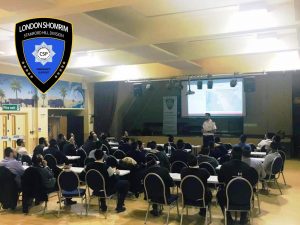COMMUNITY SAFETY PATROL
An integral part of London Shomrim is our community safety patrol, which operates 6 evenings a week, resting only for Shabbat and High Holidays .
Our dedicated volunteers give their valued time to patrol the local neighbourhood, facilitating the arrest and prosecution of hundreds of criminals every year.
All Shomrim volunteers go through an extensive screening and training process to ensure that they can cope with the pressure and act exclusively within the law. Every Shomrim volunteer receives training in counter-terrorism and first aid, as well as training on crime prevention by the Metropolitan police.
All Shomrim volunteers are DBS checked. While on patrol, they wear stab-proof vests and carry an ID card, a two-way radio, and a first aid kit.
Because of their unparalleled knowledge of the local area, our volunteers are able to gather evidence that would otherwise be unavailable to the police, as well as prevent crimes before they happen.
While on patrol, Shomrim volunteers protect all members of the community, regardless of ethnicity or religion, creating an environment where local residents of diverse backgrounds know that Shomrim’s neighbourhood patrols can be relied on to act with professionalism and compassion.
We believe that Shomrim provides a model of how ordinary people can organize to assist the police and local government in making the community safer for everyone.
24-HOUR HOTLINE
Since its inception, London Shomrim’s 24-hour hotline has been a lifeline for the entire community, for anyone who needs to report a crime or suspicious activity but for language barrier or other reason are unable or afraid to do it directly to the police.
With volunteers always on call, Shomrim can respond within 1 minute of receipt, usually arriving at the scene in under 5 minutes, something that the local police (limited by their coverage of a much wider area) struggle to match. Shomrim’s quick response time means that vital evidence can often be gathered, resulting in successful identification, prosecution and restitution for the victims.
Hotline volunteers receive extensive training and take every incident with the utmost seriousness. All calls are recorded and stored securely, enabling them to be shared with the police when necessary. In line with our efforts with local forces, Shomrim reports all criminal incidents to the police.
In the majority of cases where Shomrim have helped to secure a conviction, the victim of the crime was not Jewish.
Members of the local Jewish community, especially for those whom Yiddish or Hebrew is their first language, often feel more comfortable calling Shomrim, than contacting the police.
However, Shomrim’s hotline is available to everyone, and each year, hundreds of people call to benefit from Shomrim’s fast response times and extensive knowledge of the local area.
HATE CRIMES
One of Shomrim’s most important duties is helping victims of hate crimes, and assisting them through the process of bringing the perpetrators to justice.
We are proud to say that last year we facilitated 22 arrests following anti-Semitic incidents, of which 11 resulted in prosecutions. Victims of antisemitic crimes who receive support from Shomrim are much more likely to see the perpetrators brought to justice than the national average.
Many victims of hate crime feel uncomfortable going forward to bring their stories to the police. Even if they do so, the police often lack the resources to follow up with the leads and gather evidence.
Following antisemitic incidents, Shomrim are frequently the first on the scene, gathering evidence and giving the victims constructive advice on how to bring a statement to the police. We remain at the victim’s side through the stressful process of bringing a complaint and giving witness testimony in court.
Throughout, Shomrim’s role in supporting the victims is vital, bridging cultural gaps between the Orthodox Jewish community and the legal system, maximising the chances of a successful prosecution.
Antisemitic incidents reported to Shomrim include many instances of verbal abuse, often shouted from passing vehicles, and aimed at children or schools. While these do not always result in prosecution, Shomrim’s care to make certain every incident is documented and reported ensures that the police have an accurate picture of the challenges faced by the Jewish community.
Shomrim’s goal is a London where everyone can go about their daily business without fear of suffering abuse because of their religion or ethnicity.
CHILD SAFEGUARDING
Shomrim of North London plays an active role in safeguarding children at risk of physical, sexual or emotional abuse.
Our Child Safeguarding Lead works closely with the police and local authorities to implement culturally sensitive interventions, protecting vulnerable children from harm, while minimizing the upheaval and turbulence in their lives, and their siblings’ lives.
As in the field of security and crime prevention, Shomrim plays an invaluable role in bridging the cultural divide between social services and the strictly Orthodox Jewish community. Using our detailed knowledge of the local community and excellent working relationship with the local authority.
Shomrim’s role in bridging this gap is essential, both in in preventing an oppositional relationship with local child-welfare services, and providing effective action to keep our children safe.
MISSING PERSONS
Shomrim members are familiar with every inch of the local area and can mobilise dozens of volunteers on the street to perform a full sweep, finding missing people before they come to harm.
In addition, we are able to use our channels of communication to circulate missing people notices, thereby harnessing the joint resources the entire community.
Last year, Shomrim successfully located 28 missing persons. This included elderly people suffering from dementia, young children, and people suffering from depression or other mental health problems.


